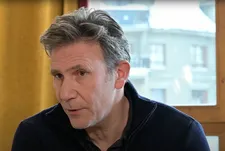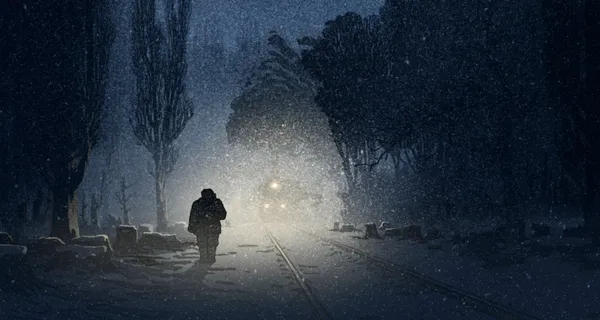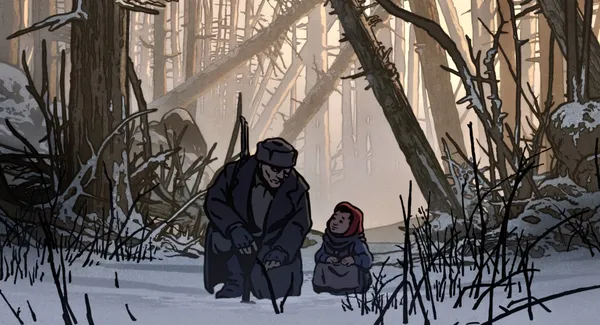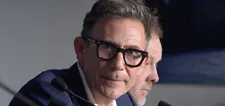The connection between director Michel Hazanavicius – who won an Oscar for his affectionate Hollywood pastiche The Artist – and his new animation The Most Precious Of Cargoes (La plus précieuse des marchandises) stretches back to his childhood.
The author of the original fairy tale Jean-Claude Grumberg was a family friend and had known Hazanavicius since the filmmaker was a boy. Hazanavicius's own family had survived the Holocaust. “I’ve been dipping in and out of this world since then. When the project came to me it hadn’t even been published yet, but I was able to read the proofs before it went to press. As I’d known Jean-Claude forever and I had been drawing myself since the age of ten it suddenly became very personal.
 |
| Michel Hazanavicius: 'I don’t have a recipe for making a hit' Photo: Richard Mowe |
“He guided me in his portrayal of the Holocaust although it was first and foremost a wonderful story and not really a film about the Holocaust as such. It was obvious that the film would be animated because the book itself was written as a fairy tale. For instance, it would have been impossible for me to film actors in a deportation train. It would have seemed false, and the suspension of credibility would not have worked. Drawings, on the other hand, do not lie and there is nothing behind them to interrupt the viewer’s experience.”
Although he was used to expressing himself visually via drawing, Hazanavicius found it difficult to show his work for the film before passing it on to his team of animators. Until this point his illustrative work had been “a private activity that I never did much with”.
With the help of Grumberg he tried to respect the tone of the 2019 book which, although sombre and dark, was also oriented toward life and love and to the people who show the best of humanity in trying to save the children and seek justice.
The director, who burst on the scene with his spy spoof OSS 117: Cairo, Nest Of Spies with Jean Dujardin and its sequels as well as The Artist (also with Dujardin) which scooped best film Oscar and best director in 2012, found it a relatively easy project to get off the ground. All the financing was in place when producer Patrick Sobelmann and the production company Studiocanal approached him.
“It took almost six years to complete. With Covid we lost a year, but in between I managed to squeeze in another film Final Cut (Coupez), a splatter zombie remake of the Japanese film by Shin’ichiro Ueda (One Cut Of The Dead),” he said. It opened the 75th edition of the Cannes Film Festival in 2023. Last year he returned to the Croisette for the premiere of The Most Precious of Cargoes to a mixed response.
 |
| Michel Hazanavicius on animation: 'Drawings... do not lie and there is nothing behind them to interrupt the viewer’s experience' Photo: Studiocanal |
“The first thing I did once Jean-Claude and I had finished adapting the book was to lock down the narrator’s text and record Jean-Louis. He was already very ill at this stage, and was losing his eyesight, but it was an incredibly touching, life-changing encounter. The story stirred his childhood memories, memories from his life, and recording was a very heartfelt part of the process.” Hazanavicius who is married to actress Bérénice Bejo, is in the throes of writing his next script about which he remains tight-lipped. However, he has just published a book Carnets d’Ukraine (Sketchbooks Of Ukraine) for which he travelled to the front line in Donbass to witness the war at close quarters and to meet soldiers and to hear their stories of combat. His grandmother was born in Ukraine and he has always harboured a close attachment to the country.
Links to his own family story can often be found in much of his work, dealing with the themes of persecution and resilience including The Search about 1999's second Chechen war; Tuez-les tous! which he co-wrote, about the Rwandan genocide, and, of course, the Ukraine book and The Most Precious Of Cargoes.
He notes that as unlikely as it may seem such films as the OSS series and The Artist also share a common value in heroes who must face up to a world moving faster than they are and which they do not understand. “It’s a bit like what we are living through at the moment,” he smiles, having previously described himself as “a cock-eyed pessimist”.
And what did his two daughters Raika and Simone think of the results of their father’s most recent labours? “After six years of watching me working like a madman they were just pleased to see it finished. But I think it really touched them.”
As chairman of the Board of Directors of the Paris film school La Fémis, Hazanavicius often finds himself being asked for his formula for success. “I explain to the students that a lot of it is to do with luck. Certainly I don’t have a recipe for making a hit – the main advantage of having a success, I tell them, is being able to make another film in its wake.”
The Most Precious Of Cargoes is released in the UK and Ireland from 4 April; in Spain from 9 May; and Argentina from 24 April. Richard Mowe talked to Michel Hazanavicius at the Rendezvous with French Cinema in Paris earlier this year.























